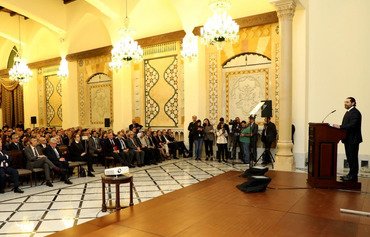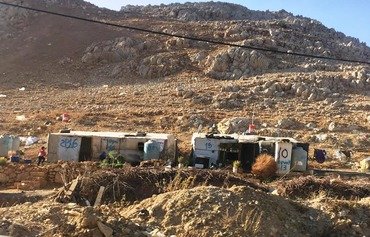As the conflict in Syria approaches its seventh year, Lebanon launched a renewed appeal to the international community to help it shoulder the burden of Syrian displacement and finance development projects in host communities.
During a January 19th meeting at the Grand Serail, Prime Minister Saad Hariri, UN Special Co-ordinator for Lebanon Sigrid Kaag and UN Resident and Humanitarian Co-ordinator Philippe Lazzarini launched the Lebanon Crisis Response Plan (LCRP) 2017-2020, which brings together more than 104 partners to assist 2.8 million highly vulnerable people living in Lebanon.
The joint plan between the Lebanese government and its national and international partners aims to secure financing totaling $2.8 billion for the year 2017.
The aid will provide immediate critical humanitarian assistance and protection to 1.9 million refugees and vulnerable Lebanese and deliver basic services to 2.2 million people, as well as invest in infrastructure, the economy and public institutions.
In the coming three years, Lebanon needs "no less than $8 to $10 billion worth of new investments in infrastructure, to upgrade already existing infrastructure, invest in new projects and compensate for the deterioration that took place due to the presence of 1.5 million Syrians", Hariri said at the launching event.
Need exceeds requested amount
State Minister for Refugee Affairs Moein al-Merehbi said the plan is a "road map for Lebanon through 2020, in which it specifies a portion of its needs for the refugees, but not all".
The estimated annual amount needed to respond to the refugee crisis "exceeds $3.5 billion needed for the provision of daily living essentials and maintenance of the infrastructure in the areas hosting the displaced", he told Al-Masahareq.
Host areas such as Akkar, the Bekaa Valley and Arsal lack infrastructure, including a working sewage system and water, and suffer from poor electricity supply and a shortage of schools and hospitals, he said.
"The infrastructure is shared by more than a million Lebanese living below the poverty line and more than 1.5 million refugees," he said.
Al-Merehbi said the requested amount "contributes a modest portion" of the actual amount needed to rehabilitate the infrastructure and create employment for Lebanese and Syrian workers.
Lebanon's population of 4.5 million is bearing the burden of 1.5 million refugees, most of whom are Syrian, he said.
"We need the support of the international community to help prevent a new [wave of] Syrian displacement to other countries, as we have seen recently," he added.
Co-operation between ministries
The Ministry for Refugee Affairs is co-operating with the ministries of education, health, labour, social affairs and interior to draw up a paper on how the government will deal with the refugee crisis, al-Merehbi said.
It will compile all ideas, reports and recommendations and submit them to the ministerial committee in charge of handling the crisis, he said.
After discussing all proposals, the government will develop a strategy that will be submitted to the Council of Ministers for approval, and which will serve as the foundation for future co-operation between Lebanon and other countries.
The response plan for 2017 "targets about 2.8 million people, of whom over one million are below the poverty line, 1.5 million are Syrian refugees" and about 300,000 are Palestinians, Minister of Social Affairs Pierre Bou Assi told Al-Mashareq.
The ministry is implementing a major part of the plan, he said, noting that it has been working on the refugee crisis from the beginning and "co-operating directly with all relevant international organisations and relevant ministries through our centres throughout Lebanon and near refugee centres".
The most pressing need is to provide support to host communities that live below the poverty line and bear the brunt of the crisis, he said, and to rehabilitate the infrastructure in the densely populated displacement areas.
The response plan aims to provide basic assistance, food, housing, social stability, education and healthcare and invest in infrastructure, such as water, energy and sewage, he said.
Bou Assi noted that "251 areas throughout Lebanon are considered the most vulnerable and host 87% of the refugees, while 67% of the inhabitants of those areas are the poorest".
Lebanon incurred losses totaling $13.1 billion since 2012, of which $5.6 billion were in 2015 alone, as a result of the Syrian displacement, according to World Bank estimates.
Additionally, the economic growth has declined from 8% in the years preceding the Syrian war to 1% after the onset of the war.
Growing needs
According to UN High Commissioner for Refugees (UNHCR) assistant public information officer Lisa Abu Khaled, the plan Lebanon presents annually "is developed in partnership with international governmental and non-governmental organisations to meet the needs of refugees and Lebanese citizens affected by them".
This year's requested funding of $2.8 billion is an increase of 13% over last year’s amount, she told Al-Mashareq.
"Fifty-nine percent of that amount will be allocated for humanitarian assistance for the refugees, and 41% for development projects to uplift the infrastructure, the economy and public institutions to help the local communities," she said.
The required amount "is commensurate with the growing needs of the refugees and host communities", she said.
About half of them are below the extreme poverty line, "but we only reach 25% with cash aid", she said.
The appeal for funding aims at equipping Lebanon to meet the needs of the refugees and shore up its economy, she said.

![Prime Minister Saad Hariri launched the Lebanon Crisis Response Plan 2017-2020 at the Grand Serail on January 19th. [Nohad Topalian/Al-Mashareq]](/cnmi_am/images/2017/02/02/7145-Lebanon-Hariri-plan-600_384.jpg)







It’s true that providing for the necessities of decent living for refugees is a humanitarian and a necessary matter, especially as refugees face huge psychological and social pressures. However, host countries and supporting entities must realise the social and economic dangers of displacement and its effect on the state’s national security. In addition to the humanitarian dimension of the confrontation of the crisis, the government must maintain, and even consolidate, its social, economic and political security, especially as the refugee crisis will cause a swift change in the social fabric of host communities. Do the Lebanese government and those in power have the political will to confront these dangers?
Reply2 Comment(s)
Thanks
Reply2 Comment(s)